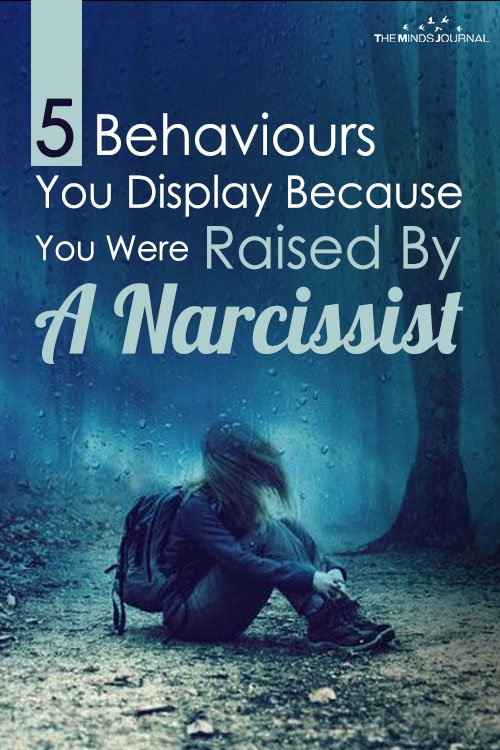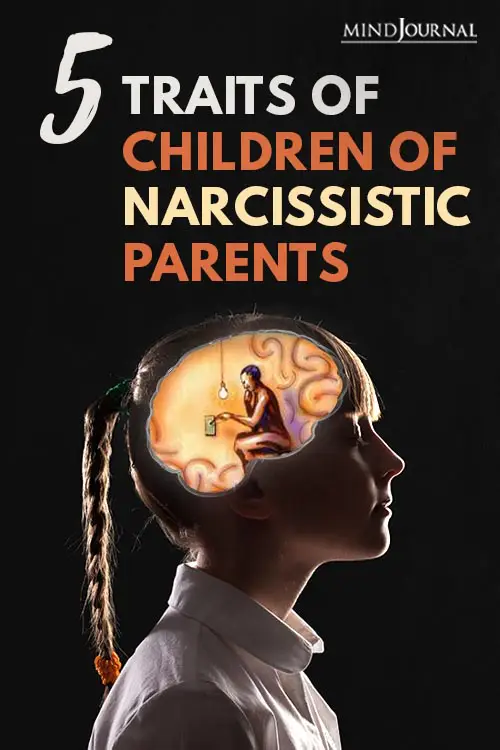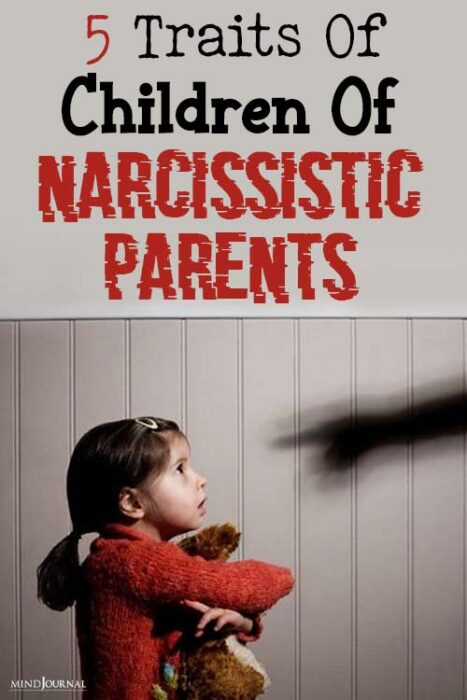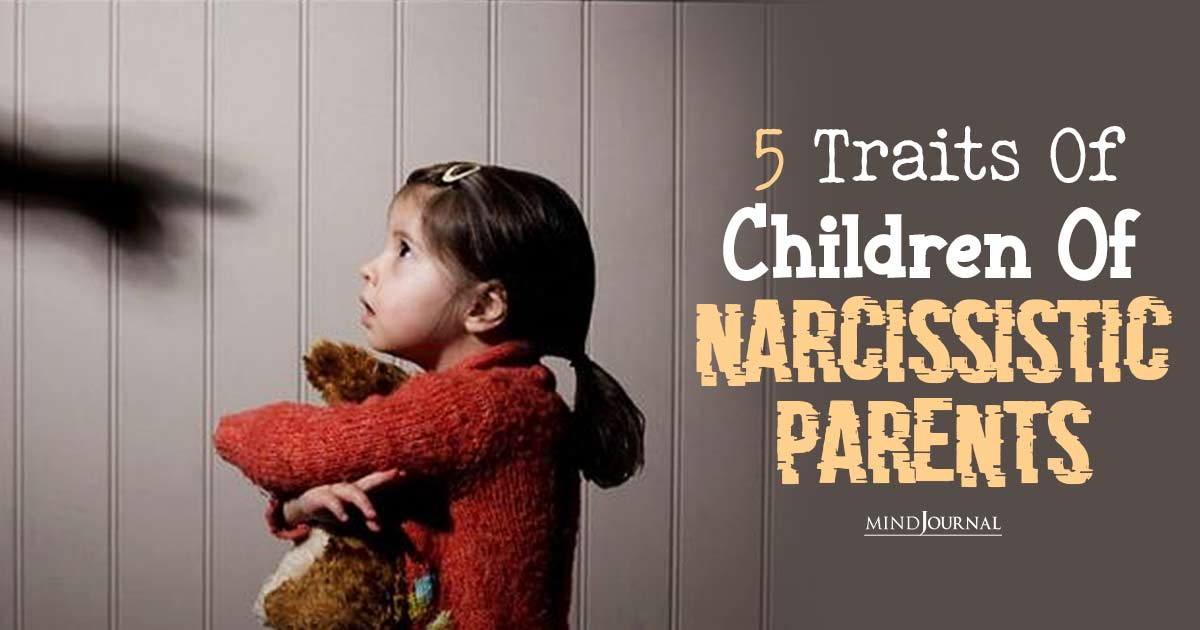Are you someone who always felt like they something was “off” about their upbringing? In this article, let’s explore the five common traits of children of narcissistic parents often exhibit and discuss how to address these patterns in your own life.
Being raised by narcissistic parents meaning having a hard time dealing with your thoughts and emotions, even if you never show that to the world.
If you were raised by a narcissist, it’s drastic effects will be reflected in your adult behaviour.
As adults, much of what we go through have their undercurrents in our childhood.
Be it our attachment problems, our issues with boundaries, or our challenges with self-worth. As we grow up and feelings pile up, unresolved, and pushed further down into the psyche, we experience physical, mental, and psychosomatic sensations that indicate something is wrong.
Yet often, the traces of the real causes are so deep down, that we have to make a serious attempt to sit down with our pain, grief, frustration, or whatever it is that is making us feel haywire and uprooted.
The above argument extends to all of us who were raised by a narcissist. It means that we were exposed to a constant stream of parental control. The kind that will balk and take offense at the slightest move towards individuation by the child.
The unfortunate thing about being born to a narcissist and then being exposed to their behavioral abuse is that one can lose sight of what is “real”.
This piece is an attempt to throw light upon those aspects that you might feel is “natural” to you, but in reality, are an outcome of your upbringing.
So what happens to children of narcissistic parents? Let’s find out!
Here Are 5 Traits of Children of Narcissistic Parents
1. You constantly doubt yourself.
Do you find yourself second guessing on most things? Do you take time to rely on your opinions and sometimes, even find it difficult to form one?
Do voices that don’t sound like your own almost always stop you, before you take an important call?
Self-doubt is a common feature of relationships between narcissists and their victims (which depending upon the context, could be their child, spouse, friend, or colleague).
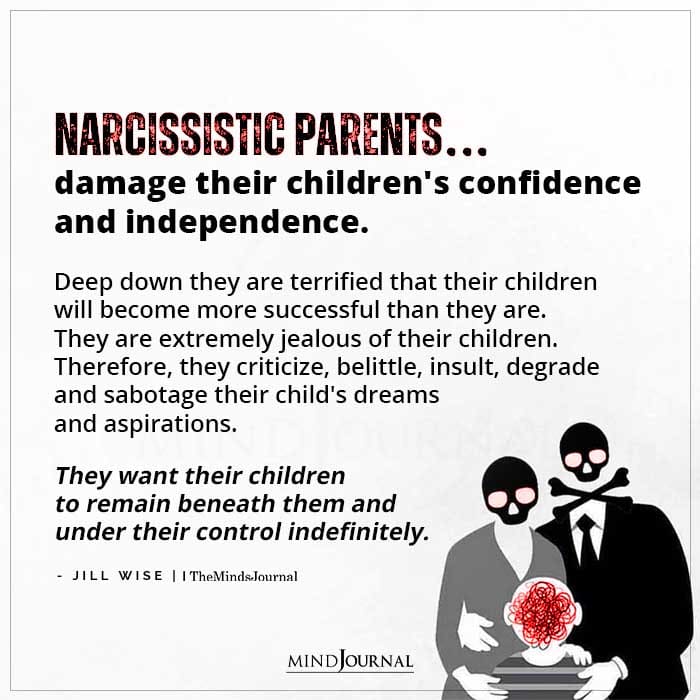
As an outcome, you might feel helpless and keep wondering why it is that an opinion or action takes so much time to be manifested for you. You might hear from people that they consider you “wishy-washy” or as someone who lacks self-trust.
Related: THE NARCISSISTIC PARENT
2. You consider winning more important than anything else.
You are perhaps someone known for their competitive streak.
When you get together with friends and play a casual game (of cards, of the pool, of tennis, can be any game really), you always carry this charge in your behavior.
In that state, your relationships get muted into the background, the playfulness of the game does not matter and the importance is given to camaraderie also reduces considerably.
Only one facet remains – your eagerness to win.
A similar theme might play out at work as well, where you’re constantly fired by challenges and will do whatever it takes to stay at the top. A hyper attitude towards triumph and victory in you could well be because you were born to a narcissistic parent.
Narcissists thrive on power games and are constantly relaying related messages overt or covertly to their children.
3. You don’t feel like you’re enough, no matter what you do.
If you go back to the previous point, it might seem like fullness and confidence is the birthright of anyone who gives predominance to winning.
However, when this behavioral trait is an outcome of being around a narcissistic parent and their overt or covert abuse, it’s different. In a narcissist’s power game, the victim is meant to reach out to impossible standards all the time.
In truth, this is to fulfill the grandiose dreams of achievement that the narcissist lives with and plays on. A narcissistic parent is seldom interested in fulfilling their aspirations on their own – their children are the baits they work with.
For several decades when the offspring gets messages from their parent that they always have to be bigger, stronger, richer, funnier and the list goes on, the former actually walks with a depleted sense of self.
Related: 20 Signs You Are The Child Of a Toxic Parent
4. You consider others’ feelings more important than your own.
If you already know that you were raised by a narcissist, you might really resonate with this one. In mind games played by a narcissist, it’s absolutely essential that they have an upper hand over opinions, over actions, and mostly over feelings.
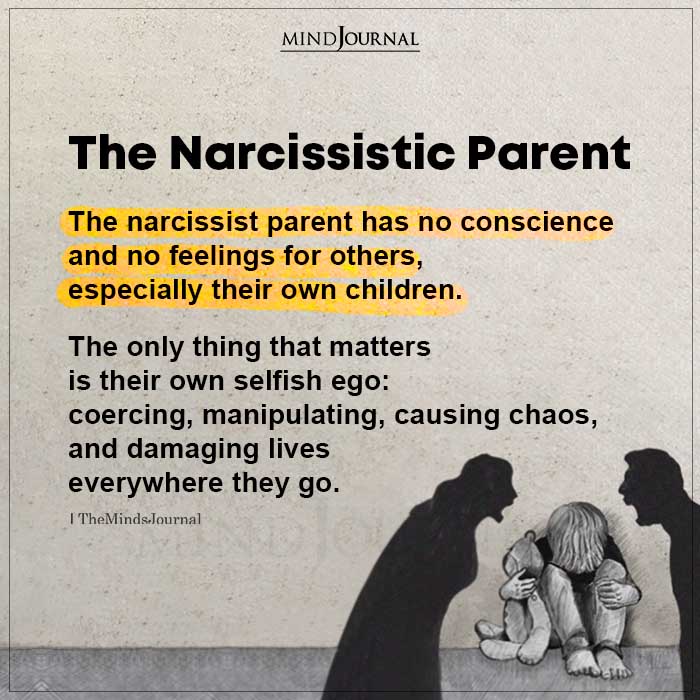
This means that they will not stop short in letting you know subtly or not-so-subtly, that their last word is the golden word, whatever that may be. They will even go as far as to tell you what to feel and how to feel.
Consequently, as someone who never got a chance to access what they truly feel, you’ll always display the tendency to keep others’ convenience above your own, to consider their feelings more than what you’re experiencing.
5. You find emotional boundaries difficult to acknowledge and hold.
Having grown up with a person who posed as someone who knew you better than anyone else, who had your best interest at heart, it’s not surprising that your emotional boundaries are so porous.
Trying to function around a narcissistic parent often results in one of the following or both :
- You repress how you feel and give predominance to how someone else feels, or
- You rebel and care only about what you feel
You switch between these two states, creating a chaotic inner landscape.
Barely there emotional boundaries can often make trust a difficult subject for you and as a result, your adult relationships could become disharmonious.
A parent-child bond underlined by narcissism can leave behind invisible marks of despair, distress and sometimes even depression.
Even if you do come to realise that your early upbringing was rooted in narcissistic behaviour, it’s important that you go slow in your recovery.
Related: 63 Most Commonly Used Phrases By Narcissistic Mothers
Need be, exploring your inner world and your past with a therapist can give you closure at multiple levels. You might want to go easy on yourself while you’re on this journey, for the simple reason that it can rake up a lot of unacknowledged feelings and sensations.
Growing up with a narcissistic parent is a pain like no other because when you needed to be seen and heard, you were in fact making sure someone else was being seen and heard.
If you want to know more about the traits of children of narcissistic parents, then check this video out below:
Frequently Asked Questions
How do you deal with a toxic narcissistic father?
You have to realize his narcissistic nature and identify the abusive and manipulative patterns. Share your troubles with those whom you trust. Be more confident and assertive, and set firm boundaries.
What are the signs of a narcissistic mother?
A narcissistic mother typically lacks empathy or goes on and off with it in an unpredictable fashion. She is hyper-critical, competitive with her children, manipulative, and always plays the victim card. She might pretend to be the perfect mother in front of others.
How to deal with a narcissistic alcoholic mother?
Encourage her to become sober or to seek treatment. Confide with a trusted friend or family member and prioritize your safety. Identify her manipulative or gaslighting strategies. Develop self-worth and confidence and be more assertive about your boundaries.
How to set boundaries with your narcissistic mother?
Be clear about what boundaries you need to set and the consequences of violations. Stick with them and don’t let any violation slide. Don’t react with anger or frustration. Be indifferent and try not to feed her any attention. Never offer explanations or justifications.
